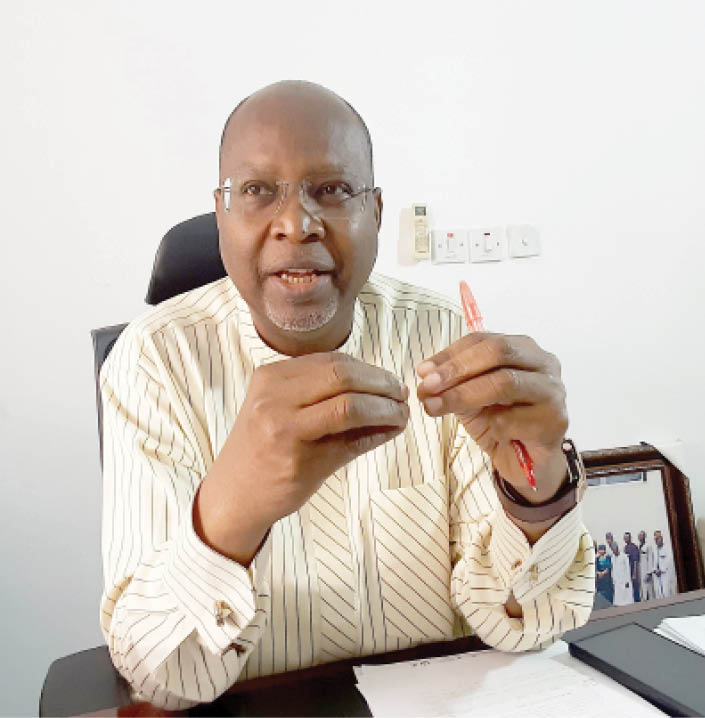Alhaji Sadiq Kassim is the president of the Fertiliser Producers and Suppliers Association of Nigeria (FEPSAN). In this interview, he explained some of the critical issues facing the country’s fertiliser industry and the need for government intervention to save the sector.
What are your top priorities presently, having assumed the role as president of FEPSAN?
My first priority is PFI, a programme of government; how do we transit and make it a sustainable programme. You will see from the record how over the years we have had progress every year since inception. So, my primary responsibility is to steer the association to a more sustainable footing and carry PFI to a larger footprint that we have had in the past.
My second biggest target and focus is to take the fertiliser sector to higher heights as a very important contributor to food security in this country. And what is my role? Now it is to first of all, ensure that we have a fertiliser policy that will ensure that the industry continues to play its role and to grow, and also to take the example of Nigeria’s PFI to the global audience.
We attended the African fertiliser and soil health summit in Kenya recently, and on the sidelines of the meetings, we presented a Nigerian case as a unique case that has not happened anywhere in Africa and the examples we have clearly shown of PPP arrangements that could transit and expand.
Our land area under cultivation has improved tremendously; we have almost doubled in terms of that. Two, our fertiliser usage has grown from 7 kilogrammes to 17 , and in some cases, some statistics are saying 22 and I have seen recently, that the government is saying let’s double it. The PFI is going to be key in ensuring that we double fertiliser usage in this country in the nearest future.
Again, if we doubled our usage to 17 or 22, from single digit in 2006, then there is progress considering Nigeria’s land size – the largest arable land available in Africa that is unexplored or unutilized. We still have a potential to grow in terms of area and in terms of soil fertility and soil fertilisation.
So, this is my third target. First, ensure, like I said, we take the association to the next level and make the PFI sustainable. Two, ensure a fertilizer policy that encourages the growth of the industry and the role that the industry plays in food security and three, increase fertiliser use in the country.
My fourth one is to say how we now take the industry global, already we’re doing 2.5 million tons of urea export. If we really put our heads together with about nine million tons capacity to produce NPK, we can supply the sub-region completely because there’s no other country that has a developed blending sector than Nigeria. So that’s my fourth pillar.
Is a cold war on between Urea and NPK blenders? Given that both are part of the FEPSAN family, why are they having problems with one supplier providing the other?
It’s a family matter and is receiving a lot of attention. All of us as players are concerned. Let me also take you back on a historical journey. When the PFI was being conceived, the urea manufacturers were two: Notore and Indorama, they were members of FEPSAN and they are still members of FEPSAN and they were called to the table; look we want to prepare a blueprint where we would produce fertiliser locally and urea is a major component, about 40% of the NPK being produced right now.
NPK is nitrogen, phosphate and potassium. Isn’t it? And 40% in that NPK is urea and it’s local. You take also other fillers – the limestone, the dolomites, all those others that would be added. We actually had a study that looked at data and said why do we import finished NPK when 60% of that product is local. The only thing that we need will be the P and the K. So let’s concentrate so the urea manufacturers were tasked; can you feed into this system? Yes, we can, and I believe government in its wisdom decided, (this is a fact that you can fact-check it).
Nigeria is a gas producer, when the supplier of gas as feedstock is given in terms of allocation to those who generate power or those who use it for cooking gas, the cost price is different from those who use it for fertiliser. Go and check and confirm. It’s about one dollar difference. Maybe if you do the math, this is probably 50% reduction.
So, for that concession, the urea manufacturers were asked to dedicate at least 35% of their production output to the local market. Secondly, because you have borrowed money, you’re going to be paying back money in foreign exchange from your proceeds. We acknowledge that you have international obligations, so the 65% you will be exporting is okay. The 35% you’ll be using for domestic so that you don’t suffer a price loss or price disadvantage, charge dollar rate but FoB because when you’re exporting, once you load on the vessel that is the pricing quote.
So, give that same price to domestic users since they will be taking it direct from your factory and handling the delivery. And the second, which was a plea from government, was, since there is a PFI that is going to negotiate bulk order, you should also consider bulk discount. This is the background.
In the first few years of PFI, it was applicable. It was happening. It was going on seamlessly. However, things changed. Well, firstly PFI was restructured from being strictly a government blending affair to be a private sector-driven activity. Members now buy the raw material, they place the order with NSIA, NSIA imports and blenders buy from NSIA, but then for the urea, which is a local just filler, blenders are asked to go and negotiate the contracts directly with the supplier. So the urea manufacturers felt stronger and decided to jettison those conditions. That is a thing of concern to us today.
We have seen that as a threat, it’s a family issue, we are going to sit with them and review and we have also alerted government of the dangers of allowing it to get out of hand because if it does, then it threatens government’s objective of food security.
Was that the catalyst for the NPK pricing increases?
Yes it was, because if 40% of the raw materials I buy I did so at an expensive rate and the balance of 40% that is imported – I also buy at dollar rate – then you can imagine both applying pressure on the NPK blender so that when he costs the finished product, he is costing it on the same basis and that is what is making NPK very expensive.
We believe that if we bring all the players together, and the government steps in, we can find a solution, the price will be lowered by at least 25%.
What makes NPK 15:15:15 more expensive than other NPK blends?
You see, in the past, every import of NPK had always been 15:15:15, so people have this mindset that that is real fertiliser and every other thing is different. Well, for the PFI, the government before 2016 had a report from the Ministry of Agriculture which says that they have done soil surveys across the country, done crop surveys across the country, and have realized that there is a need to have a generic blend 20:10:10 instead of 15:15:15 because 20:10:10 is giving you at least five more of urea and five less of potassium phosphate so you have a better blend. So it became a generic blend to replace 15:15:15. But then, during these few years we have seen different other blends coming into the fold.
Fertiliser adulteration is a common complaint in the market, and the Fertilizer Quality Control Act of 2019 is meant to address this issue. Do you think it’s a failure of regulation?
Yes, with all sense of responsibility, I will say the regulator has fallen below expectations. All of us players in the sector joined hands to get this Act; we participated in all the processes of the bill and got it passed by the National Assembly and signed into law. But what we have not seen is the regulator living up to expectations and being able to enforce the qualities.
I think it is a matter of maybe technical incapacity. And what I have always said recently as the law was passed is that there was no established, defined regulatory government agency. The Federal Ministry of Agriculture has a department called Farm Input Support Services (FISS) which is supposed to be the policy arm of government on issues to do with farm inputs. We felt they could be scaled up to assume a regulatory function apart from the policy function but then fertiliser is only one input, there are other inputs and those other inputs don’t have a regulatory Act so you have a department that has a function, one given to it by law but on the other hand, it doesn’t have.
So, what we are looking at is for lawmakers to now amend the law. This is what as a person I believe. Amend the law, probably transfer that regulatory function to maybe the Nigeria Institute of Soil Science because it is a regulator for the practice of soil science and fertiliser is a soil-related issue.
When the Fertiliser Act was enacted, the institute was not created, it came later, now that we have it, can we now put this regulatory function on them? This is the way I feel. But if that’s not happening, I believe that all of us stakeholders must come together to upgrade the capacity of FISS to be able to deliver because if we don’t, we will suffer the consequences.
Are you concerned that the stock at members’ blending facilities won’t be able to meet the requirements during this wet season, particularly in light of the urea issue?
Urea is just one component of NPK blending. If you look at the other stocks, by the time you aggregate all of them, what we have in stock can produce 280,000 metric tons of NPK and 280,000 tons would give you 5.6 million bags which is adequate for the start of the season.

 Join Daily Trust WhatsApp Community For Quick Access To News and Happenings Around You.
Join Daily Trust WhatsApp Community For Quick Access To News and Happenings Around You.


